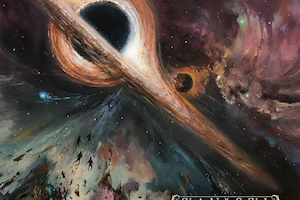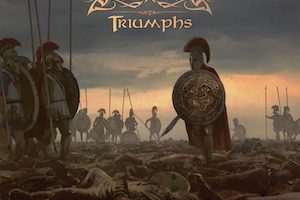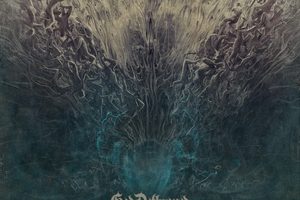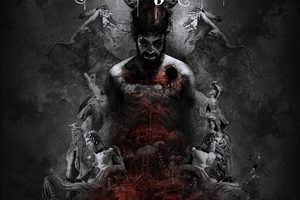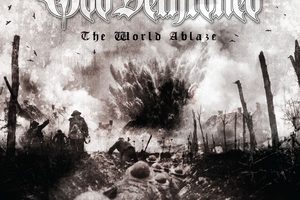Haliphron – Hunting for Prey
Thursday, 16th March 2023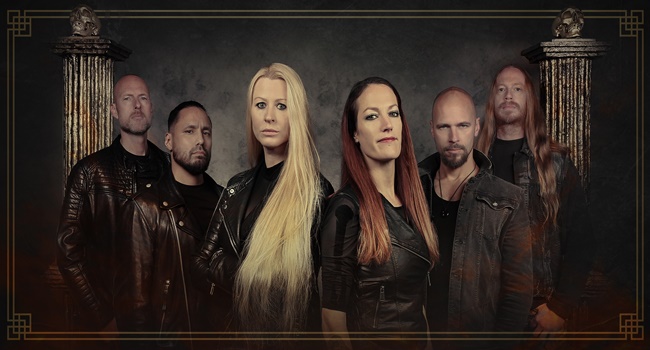
You build a strong community of musicians as people pay attention to other acts – which often allows new bands to arise. Case in point – Dutch sextet Haliphron. Containing members with ties past and present to Izegrim, God Dethroned, and Bleeding Gods, this entity explores a symphonic form of bombastic extreme metal. Equally as melodic as it can be deadly, their debut album Prey illustrates a sound that is intoxicating, crushing, plus hypnotic. To learn more behind the band, we reached out to guitarist Jereon Wechgelaer to bring us up to speed on how the group formed, the individual recording process behind Prey, the hunter aspect that penetrates the lyrics, how the band moniker came to be, thoughts on festivals versus club shows, and future hopes for the group.
Dead Rhetoric: The origins of Haliphron took place in 2021, as you are a sextet of musicians with members associated with acts like God Dethroned, Izegrim, and Bleeding Gods among others. How did the main lineup form, and did you know right away the type of style you wanted to develop with Haliphron or was there a feeling out process to arrive at the powerful extreme metal mix present?
Jereon Wechgelaer: Like you said it started in 2021. The founding member of Haliphron is Ramon Ploeg, the other guitar player. He decided to write some music during the pandemic, you couldn’t go to concerts, we couldn’t play, he just wrote some material on guitars and with basic drums. He called me as a fellow guitar player as we’ve known each other for ten to twelve years. He asked me what I thought of it, and I was blown away by the whole concept. I joined up, and obviously Ramon also plays in Bleeding Gods, so he called Jessica Otten to play bass, and David Gutierrez Rojas as the keyboard player. We needed a singer with someone who could scream, whisper, and growl – and I knew Marloes Voskuil from Izegrim and what she is capable of. We were blown away from the demo tracks, and then you can see David played a lot of orchestration – it felt like you were almost listening to a movie. And then we got Frank Schilperoort on drums. We’ve known each other for almost ten years – we all know what we can expect from each other, especially in terms of the musical influences, our good points, our strong points.
Dead Rhetoric: How would you compare the guitar styles between yourself and Ramon, and what you are able to do within Haliphron?
Wechgelaer: Good question. Ramon is the rhythm guitar player, and our playing is different. I am more riff-oriented, more thrashy, and he is more old school, 90’s and Metallica-based with chords. He’s really good at making memorable guitar riffs, I’m more of a lead guitar player to add some things on top of it. We are really complementary to each other.
Dead Rhetoric: Prey is the debut album for the group. How do you feel the songwriting and recording sessions went for this set of material – were there any specific challenges, obstacles, or surprises that came up during the process?
Wechgelaer: It was totally different than what I was used to. I’m used to being in a band that plays a lot together in a practice room. With my former band we had our own practice room we could go there any time of the day. With this band, all the songwriting pieces came together at home, individual from each other. The bass would be laid down in one home, then David would lay down his keyboard parts. We did some things with acoustic guitars, it was all fine tuning. There would be times where we would be all together online, talking to each other, telling one person to listen to this. The feeling was kind of like the same as sitting together in a rehearsal room to exchange ideas – but how we arrived at that is 90% this time online.
Dead Rhetoric: Are there any songs that stand out to you, or maybe were difficult to reach in a final conclusion from the initial demos?
Wechgelaer: Most of the songs went through a fine tuning process, you can definitely hear some of the sophisticated layering of the music. Especially the orchestrations taking a bigger part in the music, making things very bombastic. I think “Prey” the title track is a perfect example of taking one and a half years of writing. That one has a long solo and it was fine tuned over and over again. It’s also one of the best songs on the album, I think. Bombastic, it can be slow and heavy – you don’t have to constantly be going at the fastest BPM through every song.
Dead Rhetoric: Is it also a challenge to get all six musicians heard in the mix without overloading the listener with the sound?
Wechgelaer: That’s also part of the fine tuning. Some of the orchestration had to be cut down, more to the point to being like a choir, a simple piano or a small layer on top of it versus twenty layers on top of already busy guitars, bass, drums, and vocals. It has to be a coherent musical theme. We don’t want us as musicians to all be up front all the time – everything that we do has to be done in a positive way for the song and for the band, especially when writing we put a lot of attention to that. Sometimes you have to put the brakes on.
Dead Rhetoric: How did the central lyrical themes revolving around the hunter or being hunted come into focus? Do you believe this is ideal content that mirrors the musical components within these songs?
Wechgelaer: Yeah. I can’t speak for Marloes because she has written all the lyrics, but I know that most metal bands write about war or horror stories. She wanted to write lyrics that were near to her heart and are interesting. Her interest goes about the human conduct- what goes on around the heads of humanity. Prey you can be the prey, “The Killing Spree” the first song is about somebody who gets addicted to hard drugs, and how you can be a prey to such a small thing, taking over your mind completely. “Prey” is about a young person being bullied; he is the prey. He dies, and the ghost of him comes back and now he is the hunter towards the people that have been bullying him. How he is living the hunter – it’s a twist. All the songs are around these types of themes.
Dead Rhetoric: The cover art takes inspiration from a mythological creature of the ocean, designed by Dimitris Tzortzis of Immensa Artis. How did the process work between the band and artist when it came to conceiving this specific final piece – and where do you see the importance of strong cover art in metal these days?
Wechgelaer: It’s really important. There is a lot of discussion about artificial intelligence on the covers these days. I really like an artist that you can interact with, fine tune the art and talk about the art with what you want to express. This is about the mythological creature that is based on one of our songs, “Unidentified Mass”. It’s about the creature living deep in the ocean, it’s not about the Kraken, but our own mythological creature, investigating where they live. Maroles found out about an octopus that lives deep in the ocean, a haliphron. So, she got the idea from that to name the band – we will get some questions about it, it’s very strong, and people can remember it. The cooperation with Dimitris, we sent him the lyrics, and in every page of the booklet he made different artwork, a connection to the song on that page of the booklet. It’s greatly impressive, he made that mythological interpretation along with our interpretation.
Dead Rhetoric: What do you consider some of the biggest challenges this early on in the career of Haliphron to establish yourselves and hopefully make a wider footprint in the global metal landscape?
Wechgelaer: Hmm. When you were talking about touring, we have booked a really big festival Copenhell which is in Denmark. Guns N Roses is playing, and we are humbled that a promoter took a chance on our music. We have a kick ass CD release show coming up in Holland, Amsterdam on the weekend that Metallica is playing there. That’s pretty awesome. It’s a nice beginning for the band. We are working with our label also on a tour. You will notice that we are very busy, it’s quite good.
Dead Rhetoric: You will have a special album release party in April as a part of a Metallica Take Over show. What can the fans expect with this show, do you look forward to interacting in this environment with fans/potential fans?
Wechgelaer: Yes, it’s already sold out today! That’s a good start, I’m not saying I’m nervous, but I am really anxious to hit the stage again. With my former band we played like sixteen years all over Europe, and the 70,000 Tons cruise in North America. What can people expect? A lot of interaction with the crowd, Marloes is a strong front woman. We want to make the best show possible.
Dead Rhetoric: When looking at your musical career, what do you consider some special standout moments – albums, tours, festival appearances, or other events, where you knew you were making a strong impact with your work?
Wechgelaer: I would have to talk about Izegrim, my former band. 70,000 Tons of Metal was one of them. We were voted the newcomer of the year. We did some touring with Flotsam & Jetsam, we played with Megadeth. That was awesome. The focus is now totally on the new band. We hope to reach the same level as we did with our other bands.
Dead Rhetoric: Do you continue to work on your skills as a guitar player – and how would you compare your skills now against your playing in your twenties or thirties?
Wechgelaer: (laughs). In my twenties I had more time to play the guitar, to be honest. When I was sixteen, I would be coming back from school, playing guitar. It was my passion, I was practicing every day. I’m not one of the best solo guitarists, but I try my best with the music we are playing. The music we are playing now doesn’t need a total shredder on the guitar, something more melodic over the music. It has to fit the music. Improving is always a good point.
Dead Rhetoric: Being a long-time musician and a part of the Dutch metal scene, what are your thoughts on the state of heavy metal in your country? Are there specific styles that seem to go over better than others, and is there a healthy amount of support for local talent as there is for the international bands that tour through your country?
Wechgelaer: I always say that when it comes to the Dutch metal scene, there is healthy support for death metal. Asphyx, Tentacle, God Dethroned is one of the founding bands. You also have a lot of symphonic metal bands like Epica, Within Temptation. I’m not so into that type of music but there is a lot of support for this. Within Temptation is one of the biggest bands from Holland. I’m amazed how many people are at certain concerts, and other times I can’t figure it out. Sometimes there will be fifty people, and at the next gig the venue is sold out. There is no magical formula. The money, things are getting expensive, gas prices, groceries – people want to save their money for some of the bigger festivals versus going to club shows. It’s a vicious circle, when the local bands don’t get any support, the venues aren’t booking the bands anymore. The bigger festivals can sell out quicker.
Dead Rhetoric: Do you have a preference for the smaller club shows over the festivals – or enjoy both equally for their own reasons?
Wechgelaer: I can remember when you play in a small club sometimes the sweat literally dripping from the ceiling. Also, I love playing for 10,000 people at a festival like Summer Breeze. There is a lot of people, press, so there are pros and cons.
Dead Rhetoric: What are three of the most important metal albums that helped shape your outlook on the genre? And what’s the best concert memory you have being in attendance?
Wechgelaer: Paradise Lost – the guitar playing I am fond of them. My guitar playing is based on old Paradise Lost. Don’t ask me for a specific album. Obituary is one of my favorite bands. The pounding, the really aggressive nature to their music, but not in a high-speed tempo. They can get so much brutality in a mid-tempo format, it’s amazing. Perhaps old school Machine Head would be my third pick. When I heard Burn My Eyes, it’s pounding, wicked vocals, great riffs.
I saw Muse, and I was really impressed by the show, even if it’s not metal. Rammstein as well, one of their early shows back in the early 2000’s. It was a small show, but the smoke machines with the breeze was totally over the audience.
Dead Rhetoric: What concerns (or worries) do you have regarding that world that we live in today, especially coming out of a prolonged pandemic? If you had the power, energy, and resources to change any aspects for the better, what do you believe needs to be worked on and looked at for the greater good of all?
Wechgelaer: We are living in a wicked world these days. In Holland, yesterday there was something on the news talking about old books need to be rewritten – you can do this, you can’t say that. You can’t travel to certain places. We are normal people, the war in the Ukraine that’s horrible. I can help, but I’m not able to change things, you have to send specialists over there. I prefer to talk about music, actually.
Dead Rhetoric: What’s on the agenda for any activities related to Haliphron over the next year or so? Will there be more work coming out for Izegrim or any other musical related activities, side projects, or guest appearances from you as well in the pipeline?
Wechgelaer: Marloes and I are 100% dedicated to Haliphron, so we have no other side projects or plan on doing anything else. I cannot speak for the other members – I know that Frank just came back from a tour with God Dethroned, he’s quite busy as a professional musician. I hope to play a lot, looking forward to playing in Europe. We will write new stuff in the meantime, we are already busy to keep the flow going.











